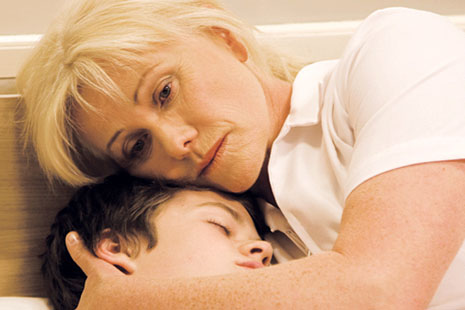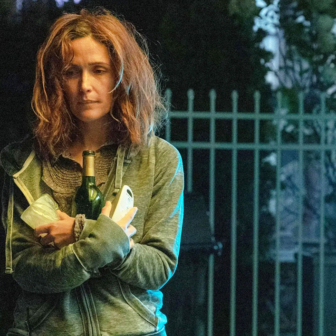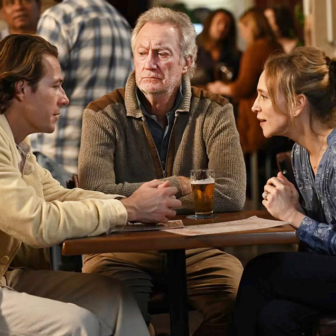ALFRED HITCHCOCK was once asked, in a television interview, what he thought about television. He did his rich fat chuckle and said, as I remember: “Oh, television’s wonderful. It’s brought murder right back where it belongs. In the family.”
As a classic melodrama on the family, Beautiful Kate does not quite contain a murder, unless you want to read the fatal car accident as occurring accidentally-on-purpose. It does contain other extreme ingredients like incest and suicide, and proceeds from that essential insight on what’s destructive in familial intimacy – Hitchcock, after all, was only picking up on Freud. For Ned (Ben Mendelsohn), the prodigal son who comes home after twenty years to be around for his father’s dying, memory rises up and asserts its grip. The flashbacks flow into and out of the present, almost merging with it; there are no sharp cuts to mark the time-breaks, so that Kate (Sophie Lowe), long dead, becomes for the audience what she was for the younger Ned, unforgettably beautiful, insistently destructive.
The script is strong, the performances stronger; with them, Rachel Ward as director builds the story into appreciable complexity. Repeatedly, the film refuses readycut psychologising. When the incestuous couplings happen, it’s not because of rural isolation, and the family strife isn’t to be charged to the faraway death of the mother, though she’s a powerful absence. The central presence is Bryan Brown’s as the irascible Bruce, and Brown has never done better; this is a fine portrait of a man perpetually at odds with himself and everyone around him. In his last days he will reach for peace, and almost manage it. Sitting dourly in his wheelchair, he lights up for an amazing moment, when Ned’s bimbo girlfriend Toni pays a brief visit to the bedroom; regaled by her Monroesque appeal, he tells her she belongs in Hollywood, and it’s what she wants to hear.
As Toni, Maeve Dermody does a splendid job of being irritating, crass and infantile, playing a child in the course of finding out what, after all, she doesn’t want: to marry Ned, a discontented pulp-fiction writer who, like his father, is caught up in quarrels with himself. He’s a cliché; Ben Mendelsohn does a lot to lift him out of it. Dermody, and Rachel Griffiths’s Sally, share a truly dynamic moment when the girl wants to know if Sally ever gets sick of slaving away for other people. Sally deals with it; she’s the virtuous woman of the story, its core of sanity, and Griffiths’ performance tells us that there’s always more to know, holding the inner story calmly in reserve. Sally keeps the household going, and teaches in an Aboriginal community. As Ned is leaving at the end, heading back to town, he asks whether she’ll be lonely, and she tells him she’s got these twenty-two little black kids who all call her Aunty.
There’s an outback world out there; we get a marvellous glimpse of it when a scattering of neighbours, black and white, show up for Bruce’s funeral – perhaps telling us something different about Bruce, something that can only be guessed at. The film is shadowed by the stories around its edges, and they’re the ones that belong in its geography. The Flinders ranges and the dusty dirt roads are visible, and the brooding mountains do atmospheric duty as the Fates. But there’s no essential connection; most of this could have happened in the suburbs, or for that matter on a Jacobean stage. The Ward–Brown production team has transposed the original American novel very skilfully. It would be good to see them developing films from stories more closely connected to their own place, time and audience.
ANA KOKKINOS’s Blessed is the other Australian-made family drama on the circuits, and it shouldn’t be missed. Like all Kokkinos’s work it’s wonderful, fiercely extravagant, bursting its own boundaries. It could only have emerged from the special film culture of Melbourne, which has always been the most cinema-conscious place in Australia. (The first Australian film festival, to my knowledge, was held at Olinda in the Dandenongs in 1952.)
Five stories are performed. There’s the feckless single mother Rhonda (Frances O’Connor), whose story shows, brilliantly, how cops and case-workers can be condemned – no fault of theirs – to deep incomprehension. Miranda Otto plays a gambling mother whose daughter needs, loves and hates her; if there’s no actual murder around here, there are certainly murderous emotions. The daughter’s friend, and partner in petty theft, has an overburdened Greek mother (Victoria Haralabidou) who isn’t feckless at all, but is mercilessly exploited as an outworker seamstress. The middle-aged white couple (Deborra-Lee Furness and William McInnes) are too harassed by money problems to notice that their teenage son is running into rather serious trouble. The kids themselves are interesting, questioning people who need far more help than they get. (They are played by Sophie Lowe, Anastasia Baboussoras, Eamon Farrow, Reef Ireland, Harrison Gilbertson and Eva Lazzaro, all of whom deserve decent professional futures.)
If the story sounds like familiar social realism, Kokkinos takes it to another level. In the always uneasy context of Australian feature production, perhaps it takes a Greek director to encompass emotional extremity: Frances O’Connor’s Rhonda, howling like a wolf when she knows, and sees, that her neglected children are dead. The same directorial courage goes into the outlier story, in which Wayne Blair plays a successful Aboriginal businessman, once adopted by a white woman, but haunted by the black mother who was closed out of his life. The adoptive mother (Monica Maughan) is aged and dying – and it was only here, in her stumbling about, with the film spilling over its own edges, that I wanted some tighter control from producer and director.
There are memories – it’s often not clear whose – of the black woman appearing with a gift and being turned away. The grownup son arrives at a partial understanding of his own and his birth mother’s loss, and he can’t stand it. Shades of Jedda, of Tracey Moffatt’s Night Cries? Or else something inescapable, always there on the map; here, and validly, part of what’s ordinary, part of the suburbs. Some have seen this story as one too many, out of key with the rest. I think it gives the other tales a deeper groundwork, and a frame.
Blessed comes out of the collaborative play, Who’s Afraid of the Working Class, by Andrew Bovell, Melissa Reeves, Patricia Cornelius and Christos Tsiolkas. Everyone in the cast does splendidly; I particularly hope for better general appreciation of that marvellous underrated actress, Deborra-Lee Furness. •





